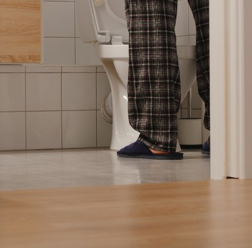 Are you waking up at night to urinate? If so, you may be suffering from nocturia. Nocturia means nighttime urination and affects about half the men over the age of 50 and 62% of men over age 70.
Are you waking up at night to urinate? If so, you may be suffering from nocturia. Nocturia means nighttime urination and affects about half the men over the age of 50 and 62% of men over age 70.
Nocturia is considered clinically relevant if men are waking up two or more times each night to urinate. Nocturia is more than annoying. It can interfere with getting quality sleep which leads to low energy, depression and increased overall mortality.
But, nocturia also contributes to falls especially in the frail elderly who may have visual and balance problems. Stumbling to the bathroom at night to urinate creates a perfect environment for falls to occur.
Nocturia and LUTS
Nocturia is a lower urinary tract symptom (LUTS). Lower urinary tract symptoms affect 70% of men over age 80. In addition to nocturia other lower tract symptoms include urinary frequency, urgency, incontinence, weak urinary stream, dribbling, and incomplete emptying of the bladder. The most common symptom of LUTS is nocturia.
LUTS are related to changes in the prostate gland, the bladder, and the urethra.
Risk factors for LUTS include aging, diabetes, obesity, smoking, high blood pressure, and neurodegenerative diseases. Chronic inflammation also plays a role in the development of LUTS.
There are several treatments to manage LUTS. But, the more common treatments to manage with LUTS tend to ineffective or only partially effective for nocturia. These treatments focus on the daytime symptoms of LUTS which typically are overactive bladder and obstruction of urinary flow related to an enlarged prostate gland.
Other Causes of Nocturia
Not all nocturia is LUTS related. Nocturia has other causes that should be excluded. These include:
- High intake of influx.
- Too much caffeine or alcohol especially before bed.
- Untreated diabetes.
- Congestive heart failure.
- Edema or swelling of the lower extremities.
- Sleep apnea.
- Medications: diuretic or water pills, lithium, phenytoin, propoxyphene, methoxyflurane, and cardiac glycosides.
- Urinary tract infections.
Treatments for Nocturia
Let’s now discuss treatments for LUTS related night-time urination. Treatments for nocturia address the inflammatory, obtstructive, and overactive bladder components that contribute to LUTS.
There are presciption medications and nutritional supplement that can be uses to treat LUTS related nocturia.
Prescription Medication
Prescription medications that help relax the bladder can be used and include:
- oxybutynin
- darifenacin
- festerodine
- solifenacin
- tolterodine
- trospium.
Medications that shrink an enlarged prostate gland can be helpful, too. These medications block the conversion of testosterone to dihydrotestosterone (DHT). DHT can lead to prostate growth and hair loss. These medications are call 5-alpha reductase inhibitors and include:
- finasteride
- dutasteride
A third group of medications include the alpha blockers which help relax the muscles in the prostate and bladder. This group includes:
- tamsulosin
- doxazosin
- alfuzosin
- terazosin
These drugs will lower blood pressure, too, by relaxing the muscles in arteries. These medications tend to control daytime urinary symptoms better than the nighttime symptoms prompting patients and healthcare providers to look elsewhere for help. That help can come from nutritional supplements.
Nutritional Supplements
We will look at 5 nutritional supplements that can help in the treatment of nocturia.
- beta-sitosterol
- melatonin
- boron
- lycopene
- pygeum bark extract
Beta-sitosterol comes from the oils in nuts and vegetables. It is a 5 alpha-reductase inhibitor blocking the conversion of testosterone to dihydrotestosterone or (DHT). This reduces age-related prostate enlargement which can block the flow of urine. It can reduce the severity of LUTS up to 50%.
Melatonin is a hormone made in the pineal gland which is available over the counter as a supplement. Melatonin is viewed by many as the master hormone since it regulates our sleep-wake cycle and circadian rhythms which governs production and release of most of our other hormones.
Two milligrams of melatonin nightly has been shown to improve nocturia.
Boron is a mineral that has anti-inflammatory properties. It reduces markers of inflammation like TNF-alpha, IL-6, and C-reactive protein. It also modulates sex hormone function to minimize prostatic enlargement.
Lycopene is a caroteniod pigment found in tomatoes that possesses anti-inflammatory properties. It reduces inflammatory cytokines like IL-6 and IL-8.
It has a propensity to concentrate in the prostate gland. It also is a mild 5-alpha reductase inhibitor reducing prostate enlargement.
And, lycopene has anti-cancer effects. It blocks the growth of abnormal cells and blocks division of prostate cells.
Pygeum bark extract comes from the African cherry tree. It has been used in herbal medicine for centuries to alleviate urinary symptoms. It works by way of several mechanisms possessing anti-inflammatory properties, reduces prostate enlargement, and controlling overactivity of the bladder.
A 19% reduction in nocturia has been shown by two meta-analysis.
Night-time urination is a bothersome symptom that becomes more common as men age. If untreated it does place older men at risk for falls and interfere with sleep.
Though we discussed nocturia that relates to changes in the lower urinary tract, nocturia has other causes that should be ruled out. So if you are a male and have nocturia, do not ignore it. Be sure to be evaluated by your doctor.
